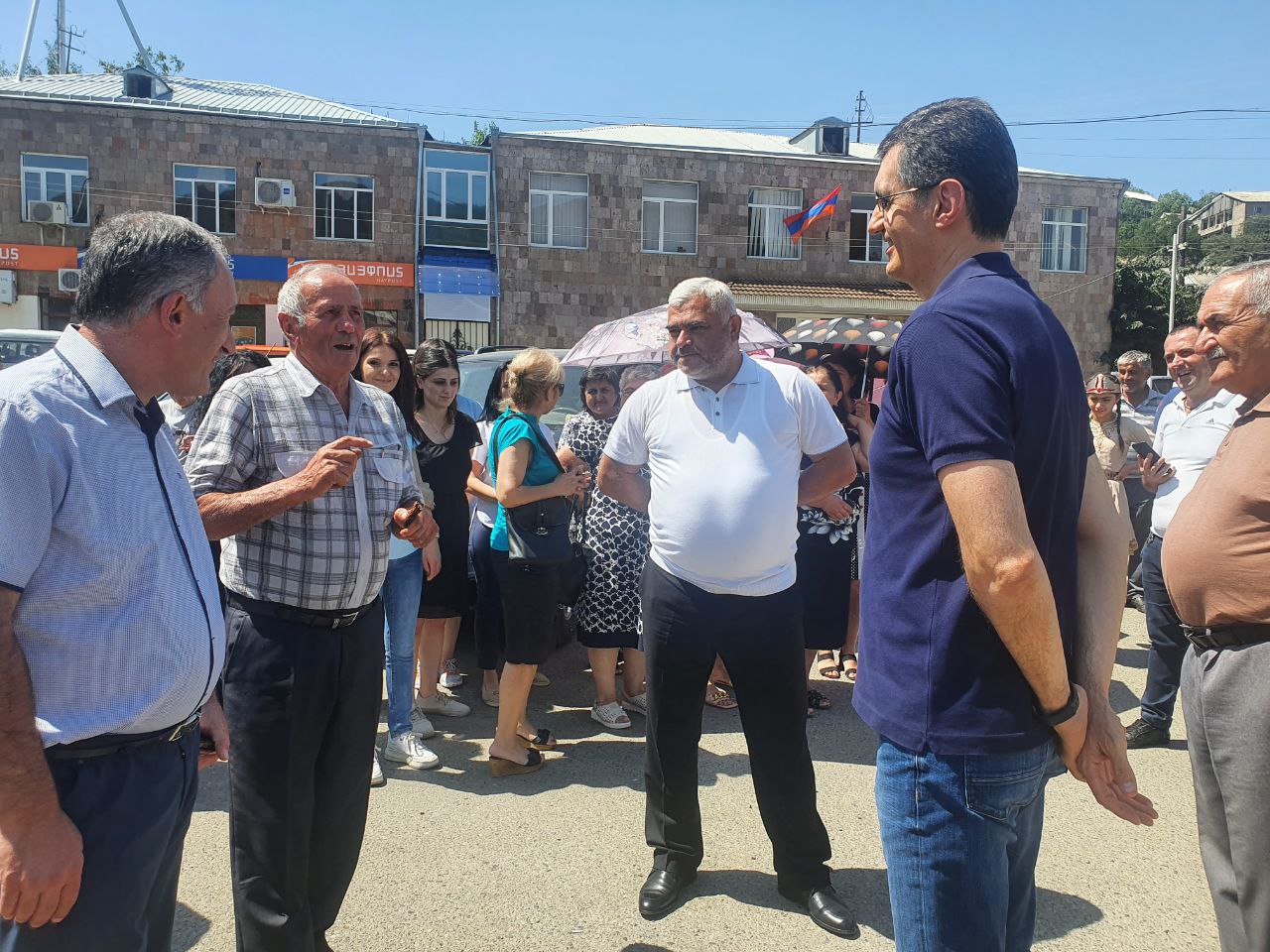
Viva-MTS: The infrastructural reconstruction works are in the process in the biggest settlement of Tavush regions
Koghb, the largest settlement of Tavush, is situated in the north-eastern part of the region. Only by 4.5 km away from the state border, it needs special attention and work.
It has been two years now since Viva-MTS and the Foundation for the Preservation of Wildlife and Cultural Assets (FPWC) are implementing projects on infrastructural development in the settlement.
2019 and 2020 were challenging for the implementation of the planned works: and yet, neither the global pandemic, nor the 44-day-long war could keep the partner organizations back from installing a new street lighting system and provide with a solar heat system at the local kindergarten.
Owing to the partners’ joint efforts around 1850 m of streets were illuminated in 2020. 50 LED lights were installed. The illumination works are in process, and the plan is to install additional 40 LED lights and illuminate around 1550 m of the community streets. Thus, by the end of 2021 with the join efforts of Viva-MTS and FPWC, Koghb will have around 3400m of illuminated streets. The deployed energy-efficient system will contribute both in making the settlement more environmental-friendly and saving budget resources.
Viva-MTS General Manager Ralph Yirikian, the Founder of the Foundation for the Preservation of Wildlife and Cultural Assets (FPWC) Ruben Khachatryan, Noyemberyan community head Karen Abazyan, the administrative head of Koghb Arsen Aghababyan, Project Coordinator Martin Maralchyan and locals were present at the launching of the energy-efficient system, also visiting the kindergarten as part of the tour.
“Every program has its beneficiaries. When implementing social responsibility programs in rural communities, we most often try to be responsive to the moods of children and young people. They have to grow free of bitter memories. Walking down an illuminated street, growing up in a warm and tidy environment shall be a normal thing, not a dream. And we manage to see the coming generations as our beneficiaries then everybody will win. Young people are our future. And that future has to be confident, happy and daring,” Viva-MTS General Manager Ralph Yirikian said.
The kindergarten, built some 70 years ago, used to be heated with coal and wood. This non-efficient and unsafe way of heating is no longer in use at the kindergarten. Now the heating of the building is provided by the modern heating system. In 2019 the Viva-MTS and the Foundation for the Preservation of Wildlife and Cultural Assets (FPWC) installed a totally new heating system powered with 30kW solar heaters. As the partnering organizations prioritize the environmental aspect of the project, they chose the heating system which would have the least negative impact on environment. This solar heating system allows using 40-50% less natural gas for the heating.
The introduction of energy-saving outdoor lighting systems in remote and borderland areas is one of the important steps in creating an Eco Villages network. This will allow these villages to be involved in a process based on the four components of sustainable development: environmental, economic, cultural and social. As a result of the program, the budget expenses of the community will be significantly reduced, there will be savings that can be directed to the solution of other problems.
Eco villages network includes selected intentional or traditional communities throughout Armenia, that are consciously designed through locally owned, participatory processes to regenerate their social, cultural, economic and natural environments. The core idea behind the whole concept of the ecovillages is integrating the four dimensions of sustainability – ecological, economic, cultural and social – through integral, participatory design. The project is a new format of the long-term cooperation between the Foundation for the Preservation of Wildlife and Cultural Assets (FPWC), Viva-MTS and the Global Ecovillages Network (GEN) in the field of environmental protection and sustainable use of natural resources.
The Foundation for the Preservation of Wildlife and Cultural Assets (FPWC) was founded in Y2002. FPWC is a member organization of the International Union for the Conservation of Nature (IUCN) since Y2012. FPWC’s mission is to publicize the unique natural heritage of Armenia and the importance of biodiversity conservation, environmental issues and the importance of preserving nature. We aim to reduce human and wildlife conflict and its consequences to reduce the risks of endangered species of flora and fauna. Biodiversity conservation, environmental education, community development and public awareness are the main directions of our activities.
Viva-MTS (MTS Armenia CJSC) is Armenia’s leading telecommunications operator, having the widest network reach and spreading a wide range of Voice and Data services all across Armenia. Having the best of the Armenian people interest at heart since its launch on the 1st of July Y2005, and in a short period of time, Viva-MTS has managed to build a nationwide network and a considerable customer base. Viva-MTS drives innovation and aims at always being at the forefront of any development serving the Armenian mobile communications market. The company follows the guidance provided by ISO 26000 (International Standard of Social Responsibility) and ISO/IEC 27001:2013 (Information Security Management System). For more information, visit www.mts.am
Mobile TeleSystems PJSC (“MTS”) is the leading telecommunications group in Russia and the CIS, offering mobile and fixed voice, broadband, pay TV as well as content and entertainment services in one of the world’s fastest growing regions. Including its subsidiaries, the Group services over 86.8 million mobile subscribers in Russia, Armenia and Belarus. Since June Y2000, MTS’ Level 3 ADRs have been listed on the New York Stock Exchange (ticker symbol MBT). Additional information about the MTS Group can be found at: www.mtsgsm.com
